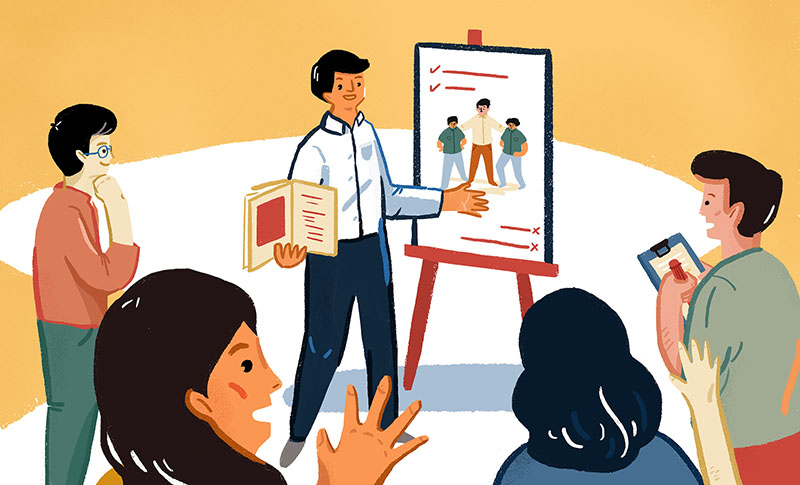How do schools handle disciplinary cases? What happens? What is the school doing? Why do they do things that way?
We spoke with parents like you, and posed their questions to:
- Mr Mohamed Sayadi, HOD Student Management, Meridian Secondary School
- Mr Muhammad Khaliq, Subject Head, Student Management, Meridian Secondary School
- Mr Chua Choon Guan, Principal, First Toa Payoh Primary School
- Mrs Jasmail Singh Gill, Retired Principal, last served at Unity Primary School
- Ms Sharma Poonam, Principal, Changkat Changi Secondary School
Who’s in charge of discipline?
Mr Sayadi: At Meridian, we have a Student Management Team, which in some other schools may be known as the Discipline Committee. I am the HOD — the Discipline Master. There is also my Subject Head Mr Khaliq, and Operations Manager Mr Sam. Each semester, we also appoint one teacher to be the “Discipline Teacher” of their level.
Ms Sharma: The Discipline Committee headed by my Discipline Master is in charge. My vice-principals and I are advisors. Supporting our discipline work is the school’s Operations Manager, a Discipline Assistant, level coordinators and the school counsellors.
Are there guidelines?
Asked by Mdm Loh Tang Ling (daughter in Anchor Green Primary School)
Mrs Gill: It’s all in the school’s student handbook that we share with parents. For minor offences such as late-coming, the child will be counselled by their teacher. If there are several repeat offences, we may reduce their playtime during recess. For major offences, students will have to write reflections on what they did, why they did it, why it was wrong and how they can prevent it from happening again. If there are multiple serious offences, boys can be given one stroke of the cane. But these are just guidelines. You cannot be ruled by your guidelines; they are just there for clarity.
Mr Sayadi: We have guidelines on how to deal with all kinds of offences, and what to do for repeated offences. The easy way to deal with each case is to refer to the guidelines. However, it is never that easy. We also need to consider other factors, like the student’s background and family situation.
Mr Chua: There are school rules and guidelines, but they are only a reference point. We need to manage discipline on a case-by-case basis. We need to know the cause of the child’s behaviour, so we can come up with the appropriate measure. It is quite a complex decision. We have to look at the child, the circumstances of the offence, and the support that a child is receiving at home and from the community.
Does MOE determine the guidelines, or is it up to each school?
Asked by Mrs Lim Siew Chin (son formerly in Pasir Ris Secondary School; still serves in the Parents’ Support Group)
Mrs Gill: There’s a broad list of major and minor offences identified by MOE, but the disciplinary measures for them are up to each school to decide.
Mr Khaliq: We share our best practices with other schools and we learn from each other. We meet with Discipline Masters from other schools in the East once every term to discuss discipline issues and compare approaches. There’s also a Networked Learning Community of Discipline Masters across Singapore.
Mr Sayadi: So we discuss our approaches, and if we find there’s anything worth changing or introducing, we’ll recommend them to the School Management Committee, for the Principal to approve.
Ms Sharma: MOE gives guidelines about being firm and fair, taking into consideration what is best for the child’s well-being and learning. Based on the student profile in each school, we may also exercise discretion. There is no one-size-fits-all approach.
Is suspension from school counter-productive?
Asked by Mr Moh Hon Meng (son in Secondary 3)
Ms Sharma: We don’t use suspension lightly. We do give students a few warnings. We may suspend a student if he poses a safety threat to the rest, because of anger management issues. Sometimes, we use suspension as a cooling-off period, when we hear one student has threatened another. But we do recognise that suspension doesn’t work in all cases. So at Changkat Changi we have this thing called Responsibility-in-Action. We get offenders to help clean and spruce up the school. This way, students can see that they can do something positive for the school. And we tell them, “if you can do this for the school, you can do something for your life.”
Have schools cut down on corporal punishment because they fear parents?
Asked by Mr Eric Chan (daughter in Dunman High School)
Mr Sayadi: It’s not because of fear. It’s because society has changed. Gone are the days when a teacher could hit a student for being disobedient. Now family sizes are smaller. Children generally get more attention, and they are able to speak up and negotiate with adults. Social media has also given them a bigger voice. So now we spend more time reasoning with students, teaching them values, so they understand and accept school rules and consequences.
Ms Sharma: I don’t think schools are afraid of parents. There are more diverse parenting styles and home circumstances. In order for us to decide on the right action to help a child to learn from their misbehaviours, we need to be open, and listen to them explain what they did. We really put a lot of work into this, getting eyewitness reports, looking at records of the student’s past behaviour, and so on. We need to look into their background. Sometimes misbehaviours are due to poor decision-making. Our approach is to educate the children. I always tell them: “The school is a safe place. If you make a mistake, you may feel lousy, but you still have an opportunity to learn, and make things better. Take this opportunity, because one day you will leave us. When you go out into society, society is not so forgiving.”
Is there still public caning?
Asked by Mdm Frances Leong (son in Evergreen Secondary School)
Ms Sharma: In the time I’ve been at Changkat Changi Secondary School, I’ve never conducted a caning in front of the whole school. It is usually done in a room, with the Discipline Master, Vice-Principal, and myself, and for serious offences such as smoking. We did do one in front of a class, when a student verbally humiliated his teacher during a lesson. We had to do it to send the signal to his classmates that respect for teachers is very important. I’m aware of public canings that have been conducted in other schools, for much bigger offences, where a signal had to be sent to the entire school.
Mrs Gill: It is in our guidelines. Because these are primary school kids, their misbehaviours could stem from unmet needs. I’d only resort to caning if I felt it would make a difference, and I’ve exhausted every other option.
Mr Chua: We don’t do public caning at First Toa Payoh Primary School. If caning is really required, it’s done in my office. No one besides me, the teachers involved, the child and his parents, will know of it. We do this to safeguard the dignity of the child. We also help the child see the link between their actions and the consequences. If we do not do that, they will feel a sense of injustice, and may develop long-term resentment. The child will come out of this experience knowing they made a mistake, and can return to his circle of friends without suffering from low self-esteem. After the caning, the counsellor, discipline master, and teachers will continue to engage the child from time to time, asking them how they are, and what they have learned from the experience.






